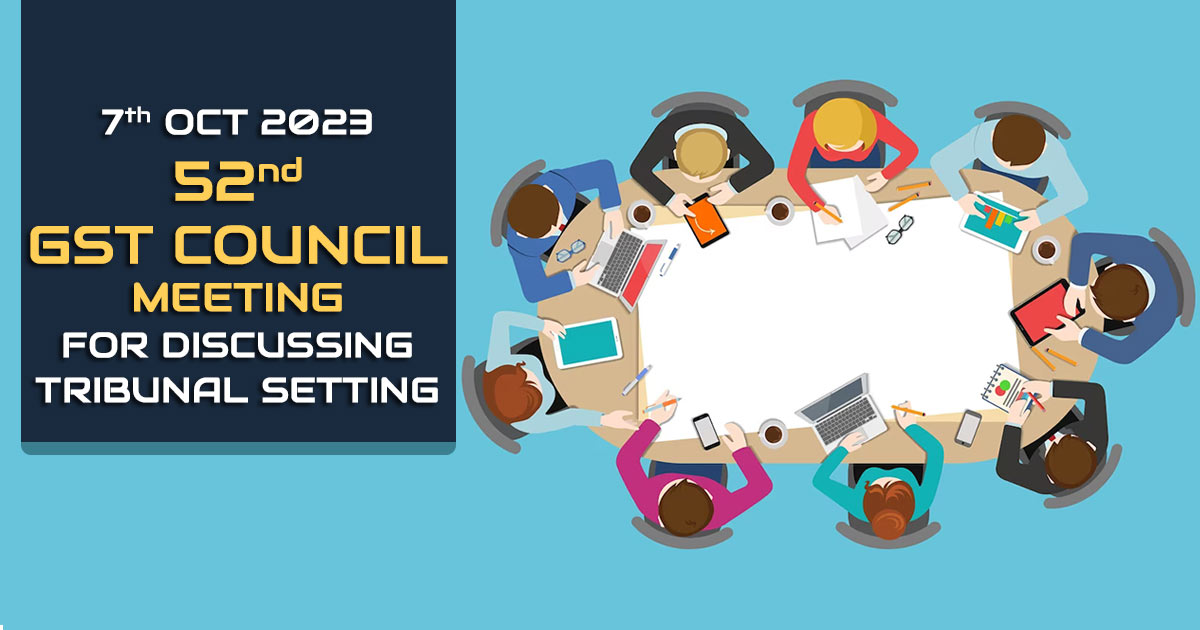
On October 7th, the Goods and Services Tax (GST) Council, the central indirect tax authority, is scheduled to assemble to address issues regarding the establishment of GST appellate tribunals and their distribution nationwide.
According to an official statement, millet flour in powdered form, comprising a minimum of 70% millet by weight, will be exempt from GST when sold loose. However, a 5% levy will apply if it is sold in pre-packaged and labelled form. Additionally, businesses are granted an amnesty scheme that extends the deadline for filing appeals with the first appellate authorities for demand orders issued by tax officers until March 2023. The enhanced pre-deposit required for this scheme will be 12.5% of the tax demand, up from the current 10%, and the deadline for appeals has been extended until January 31, 2024.
The 52nd GST Council meeting will take place in the nation’s capital, as announced through a post on the council’s social media handle. However, the post did not disclose the specific meeting agenda. An individual associated with government discussions suggests that the meeting will be concise, primarily focused on technical aspects related to tribunal setup, and is not expected to result in any changes to tax rates, added the person.
GST 52nd Council Meeting Update
- A GST Amnesty Scheme to extend the three-month time limit for submitting an appeal for all orders issued up until March 2023 with a 12.5% pre-deposit of tax, of which 2.5% is paid in cash, until the 31st January 2024.
- Proposed amendment to CGST Section 159: Automatic reinstatement of provisionally attached property after one year.
- It has been clarified that GST will not be applicable to personal guarantees provided by directors to banks in support of credit limits or loans granted to their company.
- The taxable value for corporate guarantees between related parties, such as a holding company to its subsidiary, is defined as either 1% of the guaranteed amount or the actual consideration, whichever is higher.
- The District Mineral Foundation Trust (DMFT) in mineral mining is entitled to the same GST exemptions as other government authorities.
- Instead of 18% a 5% GST is to be levied on the Job services to process barley into malt being “job work in regard to food and food products”.
- To levy 28% GST on gaming companies 18 states have passed the amendments which come into force from the date 1.10.2023 including with the GST Rules while 13 have not been notified of changes till now.
GST Rate changes on goods - Millet flour in powder form is blended with any other atta with a 70% composition of millets under (HS1901) to levy 0% GST if sold loose and 5% GST if sold pre-packaged and labeled.
- GST on ENA for industrial usage is subject to an 18% tariff rate under a distinct HS code.
- On imitation, zari thread or yarn made out of metalized polyester film or plastic film (HS 5605) without refund due to inversion a 5% GST is to be levied.
- Water supply services, public health services, and related services provided to government authorities, including composite services comprising up to 25% of the aforementioned services, are exempt from GST.
- Conditional IGST exemption is granted to foreign-flagged and foreign-going vessels when they switch to coastal operations, provided they revert to their original status within six months.
- GST exemption applies to both standalone and composite services offered to Central/State/Union Territory governments and local authorities for Panchayat/Municipality functions.
- Bus operator companies that sell their services through e-commerce platforms are excluded from the purview of CGST Section 9(5), enabling them to remit GST and claim Input Tax Credit (ITC).
- All services provided by the Indian Railways will be subjected to the forward charge mechanism, with the availability of ITC for meeting tax liabilities.
Download the Official Press Release
Expectations
Earlier this month, the government officially notified the creation of 31st GST appellate tribunal benches across the country, a long-awaited measure aimed at accelerating the resolution of disputes between the government and businesses, as well as between central and state governments regarding GST. Uttar Pradesh will have three benches, while Karnataka and Rajasthan will each have two, and one designated for northeastern states.
After the establishment and once becoming functional in these states, these tribunal benches are expected to alleviate the burden of cases on high courts. Experts anticipate that it will take approximately three to four months to establish the necessary infrastructure and appoint personnel to make the tribunals operational.
Important: Will GST E-invoicing 5 Crore T.O. Increase Burden? Experts View
These tribunal benches will include representation from both central and state authorities, marking a significant milestone in the GST framework as it provides a dedicated destination for resolving disputes.
The system has encountered various disputes, encompassing issues like GST input tax credit availability, refunds, ocean freight, and online gaming. Tribunals serve as the ultimate fact-finding authorities, leading to the resolution of many disputes at this level.